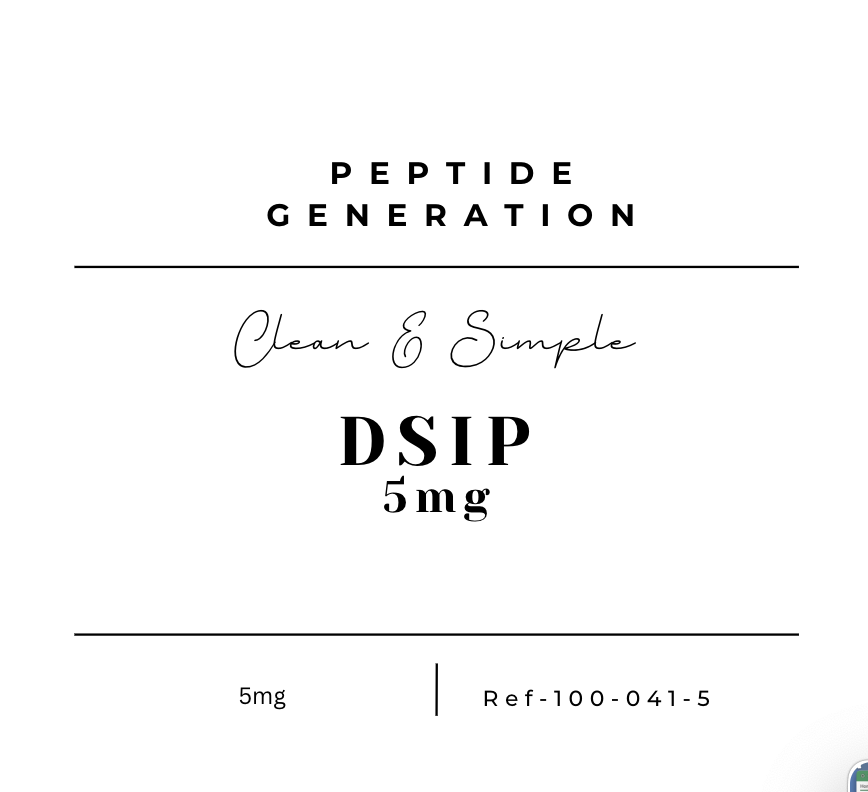 Image 1 of 1
Image 1 of 1


DSIP 5mg
DSIP is a naturally occurring neuropeptide first isolated in 1977 from rabbit brains.
It’s composed of 9 amino acids (a nonapeptide) and found in various brain regions, blood plasma, and peripheral organs.
Its name comes from its original discovery: it was thought to promote delta-wave sleep (deep sleep).
Available today mostly through compounding or research supply, since it’s not FDA-approved as a medication.
⚙️ Mechanisms of Action (Proposed)
Research suggests DSIP has multiple neuromodulatory roles, though its exact mechanism is still not fully understood:
Sleep regulation → May promote delta-wave activity, deeper restorative sleep, and circadian rhythm balance.
Endocrine modulation → Influences secretion of LH (luteinizing hormone), ACTH, and may regulate cortisol and melatonin cycles.
Neuroprotection → Reduces oxidative stress and stabilizes neuronal membranes.
Pain & stress response → May act on opioid peptide systems and modulate stress-related hormones.
Immune support → Shows some immunomodulatory effects in preclinical models.
📌 Potential Benefits (Research/Clinic Settings)
Improved sleep quality (deep sleep, fewer nighttime awakenings)
Reduced stress & anxiety
Better hormone balance (especially cortisol and growth hormone regulation)
Neuroprotection (studied in epilepsy, neurodegeneration, oxidative stress)
Pain management (linked to endorphin pathways)
Jet lag & circadian rhythm support
👉 Evidence is mixed—some studies show benefits, others inconclusive.
⚠️ Safety & Side Effects
Generally reported as well tolerated.
Side effects: mild fatigue, headache, vivid dreams, or slight dizziness in some individuals.
Long-term safety data is lacking.
Not recommended in pregnant or breastfeeding women, or in those with severe endocrine disorders, unless supervised by a physician.
✅ Key Takeaways
DSIP = 9-amino acid peptide studied for its role in sleep regulation, stress reduction, and neuroprotection.
Dosing: usually 100–500 mcg subQ before bedtime, from a 10 mg vial.
Evidence: Some promising results for sleep and stress, but research is limited and not conclusive.
Status: Experimental, not FDA-approved, available mainly as a research peptide.
DSIP is a naturally occurring neuropeptide first isolated in 1977 from rabbit brains.
It’s composed of 9 amino acids (a nonapeptide) and found in various brain regions, blood plasma, and peripheral organs.
Its name comes from its original discovery: it was thought to promote delta-wave sleep (deep sleep).
Available today mostly through compounding or research supply, since it’s not FDA-approved as a medication.
⚙️ Mechanisms of Action (Proposed)
Research suggests DSIP has multiple neuromodulatory roles, though its exact mechanism is still not fully understood:
Sleep regulation → May promote delta-wave activity, deeper restorative sleep, and circadian rhythm balance.
Endocrine modulation → Influences secretion of LH (luteinizing hormone), ACTH, and may regulate cortisol and melatonin cycles.
Neuroprotection → Reduces oxidative stress and stabilizes neuronal membranes.
Pain & stress response → May act on opioid peptide systems and modulate stress-related hormones.
Immune support → Shows some immunomodulatory effects in preclinical models.
📌 Potential Benefits (Research/Clinic Settings)
Improved sleep quality (deep sleep, fewer nighttime awakenings)
Reduced stress & anxiety
Better hormone balance (especially cortisol and growth hormone regulation)
Neuroprotection (studied in epilepsy, neurodegeneration, oxidative stress)
Pain management (linked to endorphin pathways)
Jet lag & circadian rhythm support
👉 Evidence is mixed—some studies show benefits, others inconclusive.
⚠️ Safety & Side Effects
Generally reported as well tolerated.
Side effects: mild fatigue, headache, vivid dreams, or slight dizziness in some individuals.
Long-term safety data is lacking.
Not recommended in pregnant or breastfeeding women, or in those with severe endocrine disorders, unless supervised by a physician.
✅ Key Takeaways
DSIP = 9-amino acid peptide studied for its role in sleep regulation, stress reduction, and neuroprotection.
Dosing: usually 100–500 mcg subQ before bedtime, from a 10 mg vial.
Evidence: Some promising results for sleep and stress, but research is limited and not conclusive.
Status: Experimental, not FDA-approved, available mainly as a research peptide.

